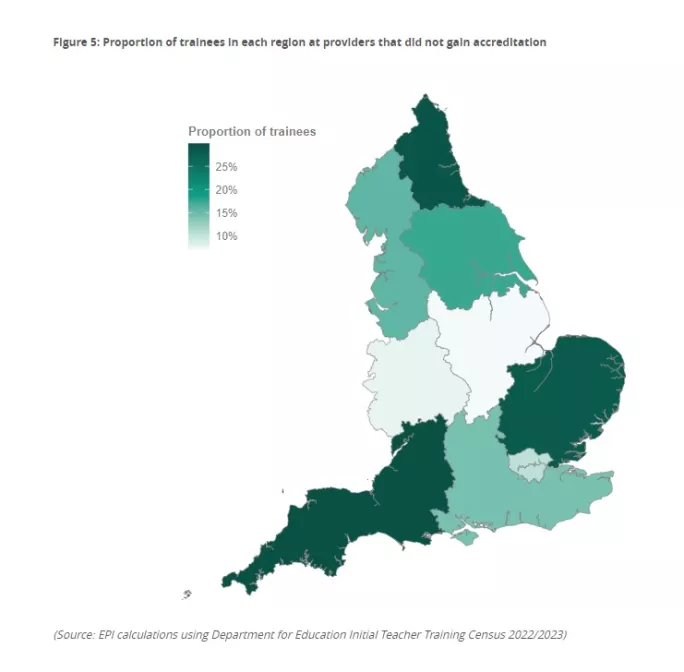- Home
- Analysis
- Specialist Sector
- Why cutting ITT providers is a gamble the DfE cannot afford to lose
Why cutting ITT providers is a gamble the DfE cannot afford to lose

It is often said the quality of an education system cannot exceed the quality of the teachers.
This means the challenge for those in charge is to recruit the best people into teaching and get the best out of them.
Unfortunately, that is not the major challenge facing education in England.
Instead, the Department for Education is simply attempting to recruit enough new graduates to plug the gaps left by a decade of shortages - and then trying to persuade them not to follow their predecessors out the door within a few short years.
Targets that won’t be met
Recruitment and retention problems were at the forefront of policymakers’ minds before the pandemic and have returned in its wake.
The department’s own forecasts indicate the country will need 5,000 more secondary teachers between 2020-21 and 2024-25. And while recruitment into the profession surged during the pandemic, these gains have evaporated as the national labour market recovers.
The latest statistics show 20 per cent fewer entrants to teacher training this year, less than two-thirds of the government’s target for secondary trainees.
With so few suitable applicants to teacher training courses, it is very unlikely the teaching profession is successfully attracting all the talented graduates it needs.
However, the department has been working hard to improve the quality of teacher training and professional development to get the best out of those who remain.
It has revamped the support for early career teachers, built new professional qualifications for more experienced teachers and, most recently, it has forced all providers of teacher training to go through a new accreditation process to demonstrate the quality of their courses.
Regional worries over future teacher trainees
The outcome of that reaccreditation process has recently been published and it reveals an extensive shake-up of the training landscape.
With no appeals successful, it means, 68 current providers will no longer be accredited to train teachers in 2024-25.
Overall, this year alone, these providers were responsible for training 16 per cent (4,491) of all trainees so, clearly, the impact of them being removed from future teacher training rounds will be notable.
What’s more, the impact of this will not be felt evenly across the country.
For example, nearly 30 per cent of the trainees in the South West, North East and East of England are at providers that did not gain reaccreditation.
Conversely, in the East and West Midlands, initial teacher training providers who failed to gain reaccreditation were responsible for training 7 per cent (152) and 7.8 per cent (244) of trainees.

Nearly a third of science, technology, engineering and maths (Stem) trainees in the North East this year are learning their craft at providers that will no longer be able to train teachers in two years.
These regional impacts, particularly in shortage subjects like physics, are important because new teachers rarely move far from where they train.
Half of them will get their first teaching job within 15 miles of where they trained. In a region like the North East, where GCSE pupils’ results fell markedly during the disruption of the pandemic, recruiting suitably qualified teachers is never easy.
The loss of 30 per cent of the region’s existing training providers will make it even harder to fill the gaps left by the pandemic and the teachers who left the profession following it.
Stem subjects already struggle with recruitment more than most. This year, recruitment was 83 per cent short of the target for physics trainees and 70 per cent short in computing.
However, these shortage subjects have not been spared in the reaccreditation process. Nationally, the loss of providers affects these subjects similarly to the more popular subjects, such as history and physical education.
New kids on the block
In addition to the 68 providers that will no longer be accredited, 25 new providers have gained accreditation.
Some of them are well known - Ambition Institute and the National Institute of Teaching, for example - but all are unproven so far and it is unclear whether they will compensate for the loss of places in affected regions.
Positively, the DfE is working with certain providers that did not gain accreditation to encourage them to work with accredited providers, but it is not yet clear how many of them will choose to do so.
A risky gamble
If these reforms achieve the stated aims of policymakers, it is possible that the new providers will deliver better training than the providers that have lost their accreditation and lift the quality of education in England.
But implementing these changes as teacher recruitment numbers collapse is extremely risky, particularly for the regions most affected and especially when the schools in some of those regions are already struggling to recruit teachers in shortage subjects.
If a system is limited by the quality of its teachers, then this is a high-risk gamble by the department that will require extremely careful planning if it is to pay off.
James Zuccollo is director for school workforce at the Education Policy Institute
You need a Tes subscription to read this article
Subscribe now to read this article and get other subscriber-only content:
- Unlimited access to all Tes magazine content
- Exclusive subscriber-only stories
- Award-winning email newsletters
Already a subscriber? Log in
You need a subscription to read this article
Subscribe now to read this article and get other subscriber-only content, including:
- Unlimited access to all Tes magazine content
- Exclusive subscriber-only stories
- Award-winning email newsletters
topics in this article



